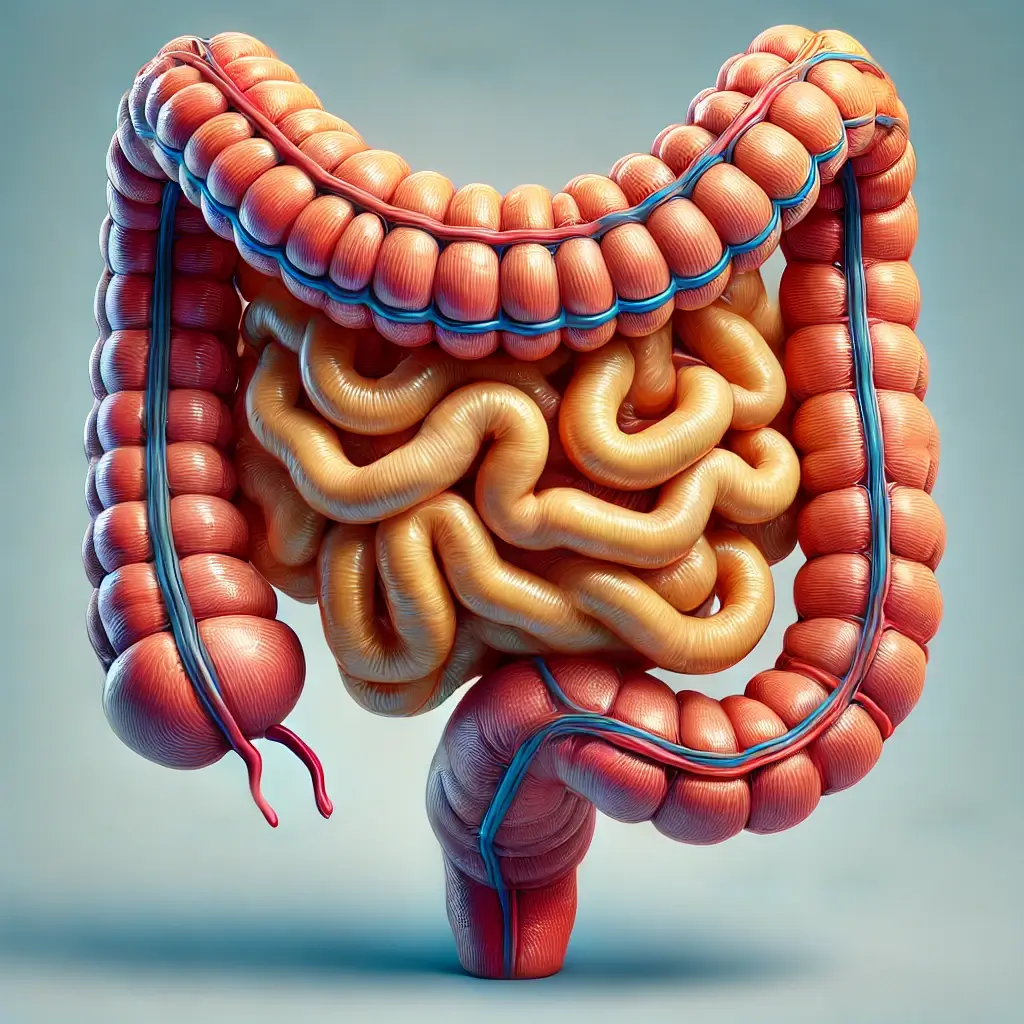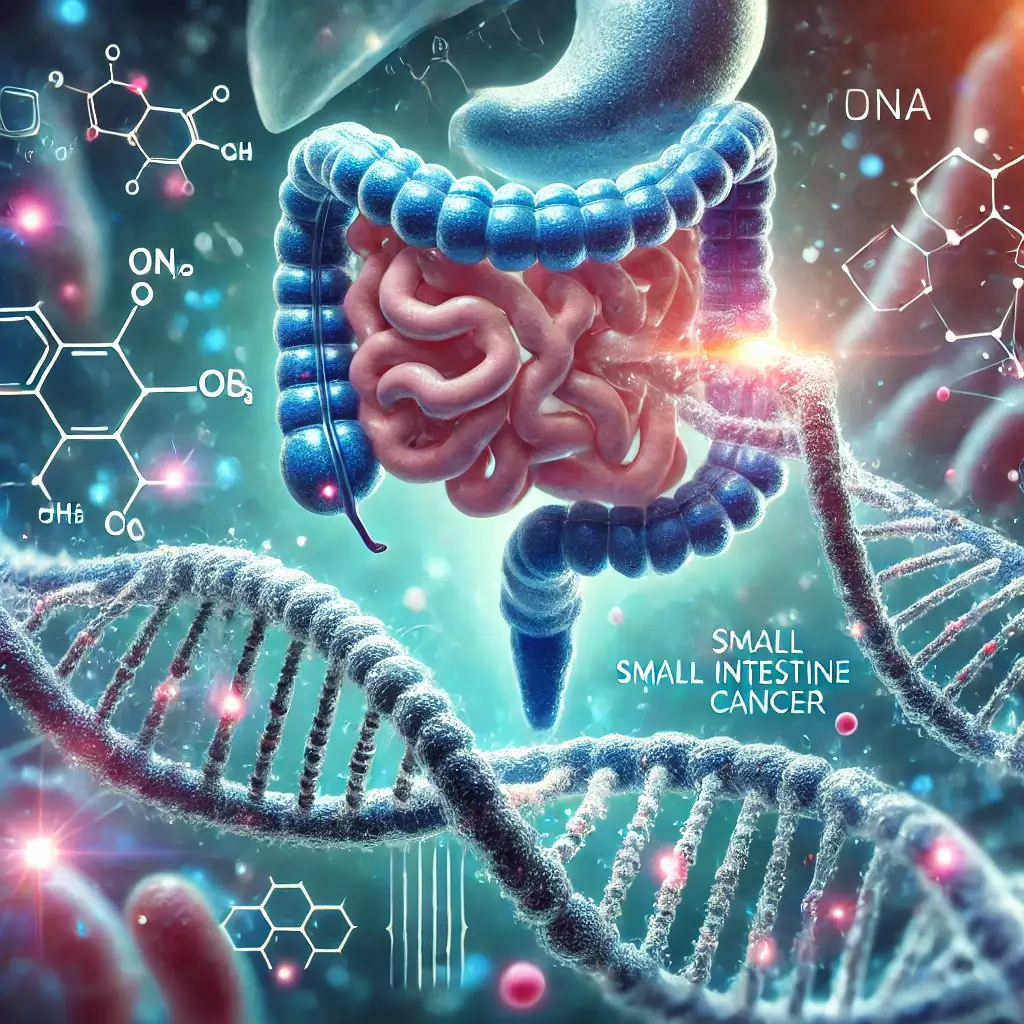Book Appointment Now
Understanding Small Intestine Cancer

Small Intestine Cancer Guide
Introduction
Small intestine cancer is a rare malignancy that develops in the small intestine—a long, coiled tube in the digestive system that absorbs nutrients from food. While it accounts for less than 5% of all gastrointestinal cancers, its impact can be significant due to delayed diagnosis. Advances in diagnostic techniques and treatments have improved outcomes for patients, highlighting the importance of awareness and early detection.
Statistics
In the United States, approximately 11,000 cases of small intestine cancer are diagnosed annually. The five-year survival rate for localized small intestine cancer is around 85%, but this drops significantly for advanced stages. Adenocarcinoma is the most common type, followed by neuroendocrine tumors, lymphoma and sarcoma.
Medical Illustrations
Histological view of small intestine cancer cells under a microscope. The image shows malignant cellular structures with irregular nuclei:

Illustration of DNA strands with genetic mutations highlighted, symbolizing the role of genetics in small intestine cancer:

Risk Factors and Prevention
a. Known Risk Factors
The exact causes of small intestine cancer are not fully understood, but several factors are known to increase risk:
- Chronic Inflammatory Diseases: Conditions like Crohn’s disease and celiac disease heighten risk.
- Inherited Syndromes: Familial adenomatous polyposis (FAP) and Lynch syndrome are linked to a higher likelihood of developing this cancer.
- Lifestyle Factors: Smoking, excessive alcohol use and a high-fat diet contribute to risk.
- Age and Gender: The disease is more common in individuals over 60 and slightly more prevalent in men.
- Previous Cancers: A history of colorectal or other gastrointestinal cancers increases risk.
b. Prevention
- Follow a diet rich in fruits, vegetables and whole grains.
- Avoid smoking and limit alcohol consumption.
- Manage chronic inflammatory diseases with regular medical care.
- Undergo genetic counseling and screening if you have a family history of hereditary cancer syndromes.
Screening
Symptoms and Early Warning Signs
Small intestine cancer often presents with nonspecific symptoms, which can delay diagnosis. Common symptoms include:
- Abdominal pain or cramping
- Unexplained weight loss
- Nausea and vomiting
- Blood in stool or black, tarry stools
- Fatigue
- Jaundice (yellowing of the skin and eyes) in advanced cases
If you experience persistent digestive symptoms, it is essential to consult a healthcare provider.
Diagnosis
Early detection is critical but challenging due to the small intestine’s location and non-specific symptoms. Diagnostic methods include:
- Endoscopy: Upper endoscopy or capsule endoscopy allows direct visualization of the small intestine.
- Imaging Tests: CT scans, MRI, or PET scans help identify abnormalities.
- Biopsy: Tissue samples obtained during endoscopy confirm the diagnosis.
- Blood Tests: Detect anemia, liver function issues, or tumor markers.
Stages
Types of Treatment
Overview of Treatment Modalities
The treatment approach depends on the cancer type, stage and patient’s overall health.
Immunotherapy: Emerging as a promising option for specific small intestine cancer types.
Surgery: Often the first-line treatment for localized tumors. Resection of the affected segment is common.
Radiation Therapy: Used selectively, often for symptom control in advanced cases.
Chemotherapy: Targets cancer cells throughout the body and is used for advanced or metastatic disease.
Targeted Therapy: Focuses on specific molecules involved in cancer growth, particularly in neuroendocrine tumors.
Comparing Treatments
| Treatment | Mechanism | Side Effects | Efficacy (Survival Rate) | Study/Trial |
|---|---|---|---|---|
| Surgery | Removes tumor | Pain, infection | 85% 5-year survival | Davis et al., 2022 |
| Chemotherapy | Inhibits cell division | Fatigue, nausea | 40% 5-year survival | Lee et al., 2021 |
| Radiation Therapy | Shrinks tumors | Skin irritation, fatigue | 30% 5-year survival | Taylor et al., 2020 |
| Targeted Therapy | Blocks specific cancer pathways | Diarrhea, fatigue | 50% 5-year survival | Brown et al., 2023 |
| Immunotherapy | Enhances immune response | Rash, flu-like symptoms | 55% 5-year survival | Green et al., 2023 |
Living with Small Intestine Cancer
Living with small intestine cancer requires managing physical and emotional challenges.
Recommendations include:
- Nutrition: Work with a dietitian to maintain a nutrient-rich diet, especially after surgery.
- Physical Activity: Light exercise improves overall well-being and reduces fatigue.
- Support Systems: Join support groups to connect with others facing similar challenges.
- Mental Health: Counseling can help address anxiety and depression.
Additional Resources
Key Takeaways
- Small intestine cancer is rare, but serious; early detection improves outcomes.
- Risk factors include chronic inflammation, hereditary syndromes and lifestyle choices.
- Symptoms like abdominal pain and unexplained weight loss require prompt attention.
- Treatment options range from surgery to immunotherapy, depending on the stage and type.
- Supportive care is essential for managing physical and emotional challenges.
Final Recommendations
- Stay informed about risk factors and discuss them with your doctor.
- Recognize symptoms early and seek medical evaluation promptly.
- Follow your medical team’s advice on treatment and lifestyle changes.
Disclaimer
The information provided in this article is intended for general informational purposes only and should not be construed as medical advice. While every effort has been made to ensure the accuracy of the information presented, it is not a substitute for professional medical guidance, diagnosis, or treatment. Always consult a qualified healthcare provider with any questions you may have regarding a medical condition, including Small Intestine Cancer. Do not disregard or delay seeking professional medical advice based on information found in this article. The authors and publishers are not responsible for any consequences resulting from the use of the information provided.
